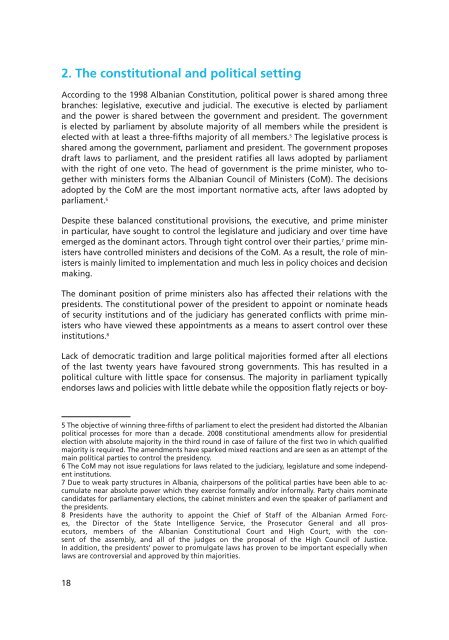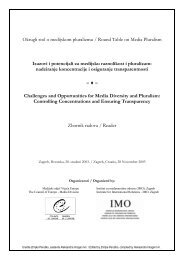almanac on security sector oversight in the Western Balkans
almanac on security sector oversight in the Western Balkans
almanac on security sector oversight in the Western Balkans
You also want an ePaper? Increase the reach of your titles
YUMPU automatically turns print PDFs into web optimized ePapers that Google loves.
2 . The c<strong>on</strong>stituti<strong>on</strong>al and political sett<strong>in</strong>g<br />
Accord<strong>in</strong>g to <strong>the</strong> 1998 Albanian C<strong>on</strong>stituti<strong>on</strong>, political power is shared am<strong>on</strong>g three<br />
branches: legislative, executive and judicial. The executive is elected by parliament<br />
and <strong>the</strong> power is shared between <strong>the</strong> government and president. The government<br />
is elected by parliament by absolute majority of all members while <strong>the</strong> president is<br />
elected with at least a three-fifths majority of all members. 5 The legislative process is<br />
shared am<strong>on</strong>g <strong>the</strong> government, parliament and president. The government proposes<br />
draft laws to parliament, and <strong>the</strong> president ratifies all laws adopted by parliament<br />
with <strong>the</strong> right of <strong>on</strong>e veto. The head of government is <strong>the</strong> prime m<strong>in</strong>ister, who toge<strong>the</strong>r<br />
with m<strong>in</strong>isters forms <strong>the</strong> Albanian Council of M<strong>in</strong>isters (CoM). The decisi<strong>on</strong>s<br />
adopted by <strong>the</strong> CoM are <strong>the</strong> most important normative acts, after laws adopted by<br />
parliament. 6<br />
Despite <strong>the</strong>se balanced c<strong>on</strong>stituti<strong>on</strong>al provisi<strong>on</strong>s, <strong>the</strong> executive, and prime m<strong>in</strong>ister<br />
<strong>in</strong> particular, have sought to c<strong>on</strong>trol <strong>the</strong> legislature and judiciary and over time have<br />
emerged as <strong>the</strong> dom<strong>in</strong>ant actors. Through tight c<strong>on</strong>trol over <strong>the</strong>ir parties, 7 prime m<strong>in</strong>isters<br />
have c<strong>on</strong>trolled m<strong>in</strong>isters and decisi<strong>on</strong>s of <strong>the</strong> CoM. As a result, <strong>the</strong> role of m<strong>in</strong>isters<br />
is ma<strong>in</strong>ly limited to implementati<strong>on</strong> and much less <strong>in</strong> policy choices and decisi<strong>on</strong><br />
mak<strong>in</strong>g.<br />
The dom<strong>in</strong>ant positi<strong>on</strong> of prime m<strong>in</strong>isters also has affected <strong>the</strong>ir relati<strong>on</strong>s with <strong>the</strong><br />
presidents. The c<strong>on</strong>stituti<strong>on</strong>al power of <strong>the</strong> president to appo<strong>in</strong>t or nom<strong>in</strong>ate heads<br />
of <strong>security</strong> <strong>in</strong>stituti<strong>on</strong>s and of <strong>the</strong> judiciary has generated c<strong>on</strong>flicts with prime m<strong>in</strong>isters<br />
who have viewed <strong>the</strong>se appo<strong>in</strong>tments as a means to assert c<strong>on</strong>trol over <strong>the</strong>se<br />
<strong>in</strong>stituti<strong>on</strong>s. 8<br />
Lack of democratic traditi<strong>on</strong> and large political majorities formed after all electi<strong>on</strong>s<br />
of <strong>the</strong> last twenty years have favoured str<strong>on</strong>g governments. This has resulted <strong>in</strong> a<br />
political culture with little space for c<strong>on</strong>sensus. The majority <strong>in</strong> parliament typically<br />
endorses laws and policies with little debate while <strong>the</strong> oppositi<strong>on</strong> flatly rejects or boy-<br />
5 The objective of w<strong>in</strong>n<strong>in</strong>g three-fifths of parliament to elect <strong>the</strong> president had distorted <strong>the</strong> Albanian<br />
political processes for more than a decade. 2008 c<strong>on</strong>stituti<strong>on</strong>al amendments allow for presidential<br />
electi<strong>on</strong> with absolute majority <strong>in</strong> <strong>the</strong> third round <strong>in</strong> case of failure of <strong>the</strong> first two <strong>in</strong> which qualified<br />
majority is required. The amendments have sparked mixed reacti<strong>on</strong>s and are seen as an attempt of <strong>the</strong><br />
ma<strong>in</strong> political parties to c<strong>on</strong>trol <strong>the</strong> presidency.<br />
6 The CoM may not issue regulati<strong>on</strong>s for laws related to <strong>the</strong> judiciary, legislature and some <strong>in</strong>dependent<br />
<strong>in</strong>stituti<strong>on</strong>s.<br />
7 Due to weak party structures <strong>in</strong> Albania, chairpers<strong>on</strong>s of <strong>the</strong> political parties have been able to accumulate<br />
near absolute power which <strong>the</strong>y exercise formally and/or <strong>in</strong>formally. Party chairs nom<strong>in</strong>ate<br />
candidates for parliamentary electi<strong>on</strong>s, <strong>the</strong> cab<strong>in</strong>et m<strong>in</strong>isters and even <strong>the</strong> speaker of parliament and<br />
<strong>the</strong> presidents.<br />
8 Presidents have <strong>the</strong> authority to appo<strong>in</strong>t <strong>the</strong> Chief of Staff of <strong>the</strong> Albanian Armed Forces,<br />
<strong>the</strong> Director of <strong>the</strong> State Intelligence Service, <strong>the</strong> Prosecutor General and all prosecutors,<br />
members of <strong>the</strong> Albanian C<strong>on</strong>stituti<strong>on</strong>al Court and High Court, with <strong>the</strong> c<strong>on</strong>sent<br />
of <strong>the</strong> assembly, and all of <strong>the</strong> judges <strong>on</strong> <strong>the</strong> proposal of <strong>the</strong> High Council of Justice.<br />
In addi ti<strong>on</strong>, <strong>the</strong> presi dents’ power to promulgate laws has proven to be important especially when<br />
laws are c<strong>on</strong>troversial and approved by th<strong>in</strong> majorities.<br />
18



